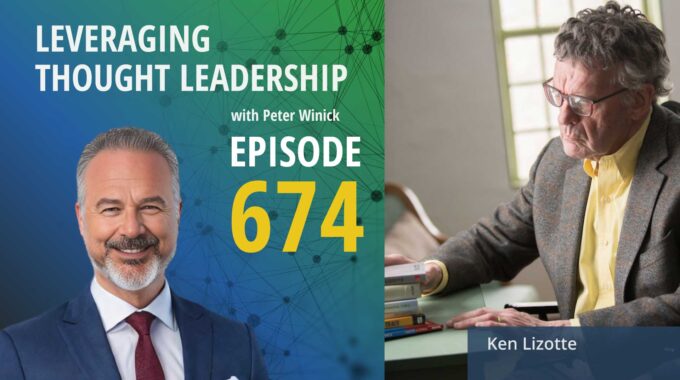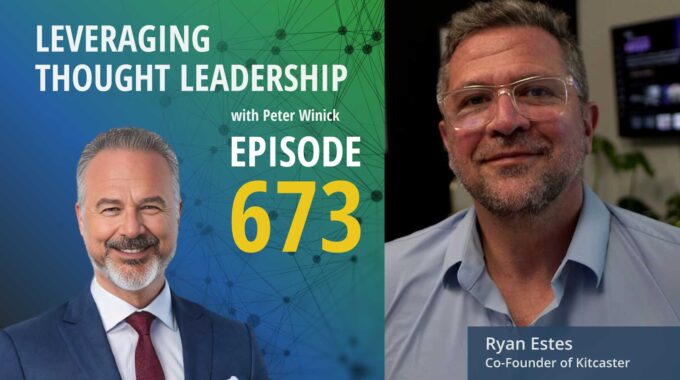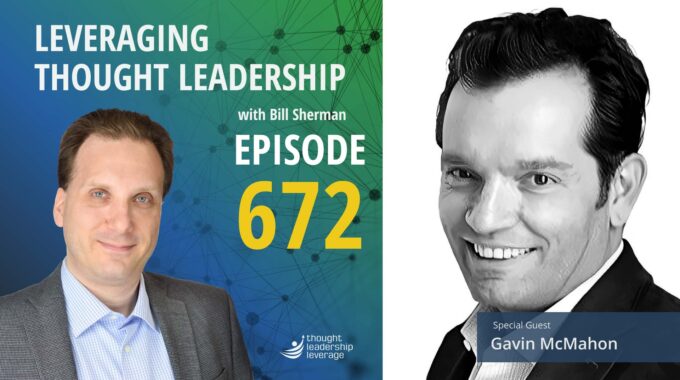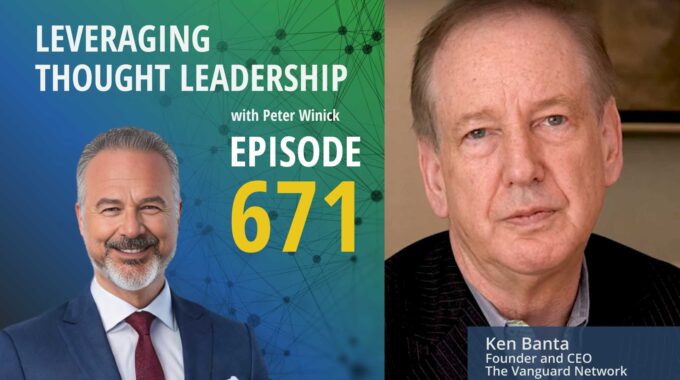Why Great Thought Leaders Don’t Play the Publisher’s Game Peter talks with publishing expert Ken…
Spiritual Thought Leadership | Kristoffer “KC” Carter
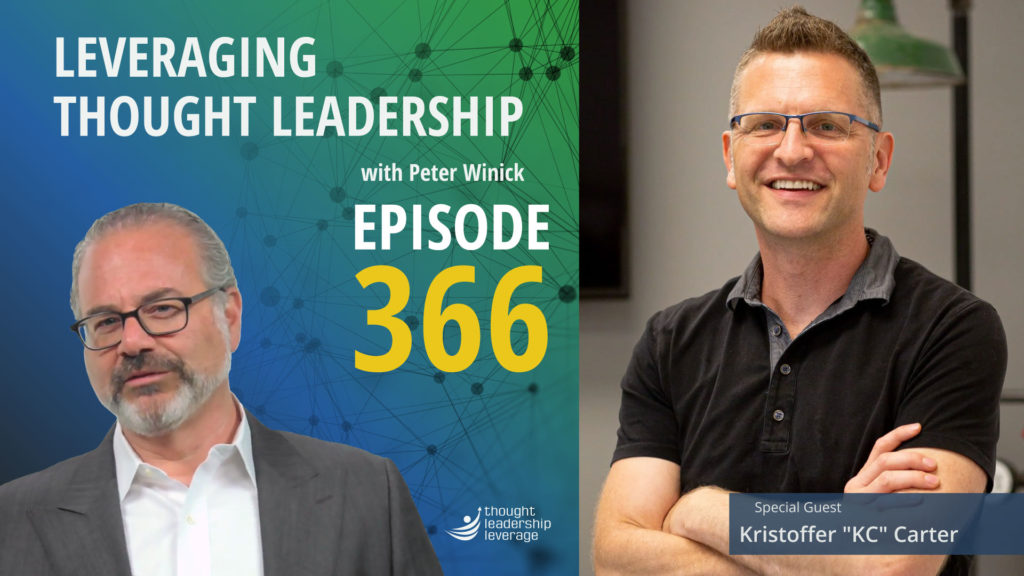
Incorporating spirituality into coaching and thought leadership
An interview with Kristoffer “KC” Carter about elevating individuals and organizations through leadership and epic spirituality.
What role can yoga and meditation play in the business world? Can leaders use these unconventional methods as an epic spiritual guide? How do you use empowering techniques to coach executives and corporations toward greater success?
Today our guest is Kristoffer “KC” Carter, author of Permission to Glow: A Spiritual Guide to Epic Leadership, which outlines the first of four permissions that will create a long-term framework for Kristofer’s works. He’s the author of Permission to Glow: A Spiritual Guide to Epic Leadership, as well as an international speaker and retreat leader who teaches at the intersection of consciousness and business.
We begin our conversation by exploring what KC means by “spiritual leader,” and how meditation connects to business and thought leadership. Techniques like yoga and Transcendental Meditation are being used by high-profile CEOs around the world, and KC’s methods bring those insights into the business world.
KC discusses the ways that spirituality and meditation are critical to business leadership, and how he’s pushing past the barriers of skepticism to bring deep insights to leaders from the Fortune 100 as well as newly-minted start-ups. He uses mindset to help leaders find clarity, and commit to the things that energize, inspire, and ignite them.
KC’s deep knowledge of instructional design is being put to good use, creating a strong thought leadership IP that is teachable, and requires only 15 minutes a day for leaders to change their lives. He shares details on his coaching certification program, allowing others to manage relationships within their organization and take back control of their lives.
If you are curious about how spiritually can give your business a boost, KC’s insights and thought leadership are a great place to start. Listen in, and it might just make your life epic, too!
Three Key Takeaways:
- Help organizations justify the expense of bringing in your thought leadership by providing benchmarks, methods for measuring success, and hard data to back up your content.
- Creating a program of certified coaches to deliver your Thought Leadership is a great way to take your message to scale.
- Without proper instructional design, your thought leadership programs could feel like nothing more than speaking notes. Take some time, and prepare for success!
If you need a strategy to bring your thought leadership to market, Thought Leadership Leverage can assist you! Contact us for more information. In addition, we can help you implement marketing, research, and sales. Let us help you so you can devote yourself to what you do best.
Transcript
Peter Winick And welcome, welcome, welcome. This is Peter Winick. I’m the founder and CEO of Thought Leadership Leverage. And you’re joining us today on the podcast, which is Leveraging Thought Leadership. Today, my guest is Kristopher Carter. And let me just give you some quick highlights from his CV here. He’s got a new book coming out as opposed to an old book coming out called Permission to Glow. He’s a spiritual guide to epic Leadership. So that’ll give us stuff to talk about. And an executive coach for life integration, all sorts of interesting thing. Keynote speaker, the usual array of things that folks that we have on here. So welcome Christopher. Thanks for coming on.
Kristoffer Carter Thanks for having me on today, Peter.
Peter Winick My pleasure. So what are the logical and linear steps one would take to become a spiritual guide to epic leadership? Because I’m sure it’s a logical linear path.
Kristoffer Carter Yeah, totally. Well, I took a class in college and. Right. It’s absolutely one of those things that shows me I would not have chosen or could have predicted what my career path would unfold to look like. I’ve always had this kind of mindset of a coach and this heart of a coach. I’m that guy that you sit next to on an airplane and share all of your biggest ambitions and deepest fears with I Never knew why.
Peter Winick Wait, what’s an airplane? Hold on. What’s an airplane?
Kristoffer Carter It’s been. It’s been a minute. Yeah. Yeah. It’s like the miracle of flight. I don’t know if you remember.
Peter Winick Yeah. I heard about that.
Kristoffer Carter It was great. But, yeah, I. I’ve always had this kind of ability to connect with people. And I helped build this startup out of Chicago called Centro. We grew from 40, 40 people to about 900 in a period of about eight years. And along the way, we won a lot of awards for our culture. And during that time I was also meditating a lot on my own kind of spiritual path, spiritual quest. And I just noticed all these, like this weird confluence of business thought leadership and also spiritual curiosity. So a lot of my clients now C-level executives at some of the biggest companies in America, and they also have a lot of spiritual curiosity. So we talk a lot about meditation practice and yoga.
Peter Winick So stay there a minute. So I remember there was an article probably 10 or 12 years ago in either Forbes or Fortune one of the big apps. Right. And it was this really interesting article about a bunch of Fortune 500 CEOs that were practitioners of transcendental meditation. And it was almost like they were coming our you know what I mean? It was like the deepest, darkest secrets because some of these guys are like, you know, we’re Fortune 500 CEOs at like, you know, three M or Metro, these conservative, you know, older guys, not what you’d think of when you think of like, ooh, that’s a West Coast like sitting in a salon, you know, contemplating your navel. So there’s interesting topics that you bring them to talk about business, thought leadership and spirituality like those three are typically on a menu. They’re not. So what’s interesting is we’re living in an age where people are sharing those things, and it seems like that’s sort of the wave that you’re on.
Kristoffer Carter Well, and I love that you bring that up, Peter, because transcendental meditation, it’s a long road. It’s a marathon. One of my mentors and heroes, this guy, David Bishop, he was the he’s the former president of Sony Pictures. I worked with him when I worked at Metro-Goldwyn-Mayer many years ago, my career, And he kind of came out recently and said he’s meditated every single day, twice a day for the last 45 years doing time. And this guy helped create the advent of Blu ray technology in the you know, he was responsible for so many innovations. And what I love about what you shared is that there there’s a definite proven kind of ancient spiritual path, you know, meditating every day and connecting with something bigger than ourselves and time, It’s called the Unified Field. And I think that is such a better path than a lot of these weekend warriors that go and do peyote or the latest whatever, like, let’s take a bunch of drugs and call it spirituality. I just really appreciate that.
Peter Winick Hello, Joshua Tree.
Kristoffer Carter Right, Exactly. Yeah.
Peter Winick So I mean, the other piece of that that’s interesting is when people start to talk in the business community and the thought leadership around mindfulness, and you have companies like Google that have embraced it, etc., it is oftentimes and I think it’s sort of a hook is they talk about it as a technology almost, right. Or use the term, you know, and then it’s like, it’s a technology, It’s like my iPhone. Now let me get addicted to that as well. Right. Like it must be cool. But, you know, clearly there’s a deep and rich history.
Kristoffer Carter Yeah, Well, it reminds me of Tony Robbins talking about NLP is the latest technology to go to sell a bunch of stuff. But yeah, I definitely consider meditation a science. Yogic science has been around for thousands of years, and the reason it’s called a science and it’s regarded as such is that it has predictable, proven results depending on the level of inputs you put into it. If you show up for a certain amount of time. And I got into this practice kind of as a skeptic, like kind of like arms crossed, prove it. And over time, the more you practice, the more you need it, the more benefits you experience. And so the results have been scientific. So yeah, I do regard it.
Peter Winick As a science. So. So this is really. Just in case, because this is where your background as a businessperson, a thought leader and then a spiritual practitioner merged because you’re talking about the benefits and outcomes of it, almost like it’s a new feature set in software. I find that really interesting. So let’s, let’s switch a little bit to Okay, so as an epic spiritual guide or whatever the label that we’re putting on these things these days, what are the underlying business models like? Do you put out a stand like, you know, lemonade, $0.05 or.
Kristoffer Carter Anything of toy? Well, I call them all Trojan horses, you know, So so the reason I started calling myself a spiritual guide to ethical leadership is it was kind of one of those lightning bolts that arrived. It’s the subtitle for my book. It’s Commissioner Glow, A Spiritual Guide to Epic Leadership. And I thought, well, on my best days, this is what I do. However, I’m very rarely, if ever, hired for that job description. I’m hired as a Fortune 100 coach, executive coach, as a meditation teacher for organizations. So I have no attachment to what my clients call me.
Peter Winick But they’re on the organization side. So I think you made a key point that I want that I want to push on. So when individuals hire a coach, they don’t really need to be responsible to anyone else to justify it, assuming they’re paying with their own funds. Right. I can hire, you know, there’s a coach for teleprompters. There’s a coach to train my dog. There’s like, Right. And I don’t need to justify to anybody. I can write a check and do whatever I like, right. When we bring it into the workplace. Yeah. And the companies are paying. There is a fiduciary responsibility to justify the investment that we’re using shareholders dollars to make this investment. So push that for me a little bit in terms of, okay, how do you sort of make the argument to the green visor people, both at the individual coaching level and then developing the capabilities of the organization? Because this to me is the money shot of where thought leadership plays?
Kristoffer Carter Absolutely. And this is why most coaches fail and fail to really pay their bills. Being a coach is they don’t total into this. I have a family of five, so not succeeding in coaching was not an option for me.
Peter Winick Yeah.
Kristoffer Carter So I use I use a little case study of my Amazon client, a great executive there. He’s in charge of about a few hundred people, $1 billion revenue stream. He hired me out of pocket through my website This Epic Life, so technically hired me as my life coaching rate and we made such progress in those first three months. He got his basically his two year plan done in about three months. He had the company rehire me through the company. And when Amazon hires a vendor, it is a vetting process that requires so much paperwork and so many milestones, documentation, milestones and but understandably so. You know, if you’re if you’re being allowed into those gates, they need to make sure that you’re the real deal that you can deliver on what you promise and that you can kind of chart your progress. So I look at that type of coaching and that type of contracting phase with corporate clients, it’s all about the on the court piece, the milestones, the benchmarks. Yes, here’s how we measure success. And I am super upfront about that because it’s peace of mind for both of us. The good news is once you’re in, they usually pay you in a lump sum all upfront. You walk out with like a publisher’s Clearinghouse check and you’re so you’re so friggin motivated to show up every single week for the rest of the year. You know, it’s kind of a win win for a small business to get that check up front. But on the life coaching side, it’s more of that off the court piece. What’s under the hood? What are the stories in the way?
Peter Winick Well, but there isn’t but that that line between church and state isn’t always so clear. So the fact that, you know, when Amazon is hiring you one is a great marquee client. But number two, clearly a data driven company and they’re not known for I mean, this is this is the company that’s known for using wooden doors as desktops, not you know Google is more known for I wouldn’t say privilege to work. Right? Yeah. The more lavish, you know, food and all these other things. So Amazon’s probably looking at it more like, okay, there’s an ROI on this, there’s an impact. We spend a dollar, we get back life. But I want to touch on the holistic piece, right? It’s really, really hard to be a business coach and say, All right, I don’t hear any crap about your family. I don’t hear any crap about you having a midlife crisis I don’t like you can’t do that. Right. But it’s sort of which is that which leads and which sort of plays subtitle, if you will.
Kristoffer Carter Yeah. Well, I think all of us have to satisfy when we’re hiring a coach, whether we’re an organization or an individual, we have to satisfy that left brain and right brain. What are we here to accomplish? How may measuring success and also that kind of qualitative piece in my clients that have been with me three years, including this Amazon client, they have this nice balance of both and it creates this responsibility on the coach or the thought leader. Sure to document and to back up what you say and prove it out. So it’s not a part of my business. It’s necessarily fun on the contracting level to lay out that granular detail.
Peter Winick How I know nobody gets into business for themselves to do enterprise level, you know? And so W’s and contracts may say.
Kristoffer Carter No totally, but the peace of mind and also the, you know, the kind of swagger in your step it gives you to be an Amazon premium vendor coach. It’s done wonders for my small business and I’m super grateful for all of it. It’s not nice. Fairly easy to service that type of client. But here’s the beautiful, dirty little secret, Peter, is that all coaching? It’s like that that scene in Avengers when Banner’s like, Here’s my secret. I’m always angry, I’m always the hole. All coaching is life coaching, I believe, you know, whether I’m coaching a C-level executive or sure, you know, a conscious parent who wants to start their own business. It’s all about those stories that get in the way and hold us back. But yeah.
Peter Winick Well, no, nobody. I mean, a CEO isn’t hiring a coach to teach them cash flow, balance sheet ROI, no strategic planning, whatever. It’s, you know what what’s getting in your way, the relationships in the workplace or what are the dysfunctions or in homework, the distractions.
Peter Winick If you’re enjoying this episode of Leveraging Thought Leadership, please make sure to subscribe. If you’d like to help spread the word about our podcasts, please leave us a review and share it with your friends. We’re available on Apple Podcasts and on all major listening apps as well as at ThoughtLeadershipLeverage.com/podcasts.
Peter Winick So I’m going to push more on the business model. So you have coaching. And I would argue that while coaching is incredibly gratifying for many, it’s a pretty crappy business model, right? No scale. It’s all based on you. What are the other sort of business lines or business models? So if I picked up your book and fell in love, how can I pay you? What can I tell you to do?
Kristoffer Carter Yeah. So the book has been great because it’s come about five years into my business journey, kind of going out on my own for the last five years. And the book is reorganized all of my service lines and offerings. So it’s going to include certification of coaches every few months will sort of certify like another group of cards.
Peter Winick Is that internal or started or the internal or external cause from a business model standpoint? There’s two business models. They’re certifying third party coaches that have their own practices in their own communities. That’s number one. And then number two, certifying inside of an enterprise people to sort of be training the trainers, certified coaches in their methodology inside of an Amazon or a Citibank. So which one of you got?
Kristoffer Carter My dream is to play in both you know, to work inside to activate organizational leaders on one side of like basically my client base who gets inspired by work together. I want to give them the tools to impact the organization. But then the third party coaches piece, I love that model so much because I don’t want to babysit their client relationships. I don’t I don’t want to be like the help desk if something.
Peter Winick Yeah, right, right.
Kristoffer Carter Should something go wrong or not be. You know, I want to empower those people to own that piece, but give them the tools and the intellectual property. So in the long term, play for me is intellectual property.
Peter Winick So when you say it’s intellectual property, there’s lots that you can do with intellectual property. And this I mean, this is like my jam in terms of you can people are really realize is the asset that you’re building is not how many billable hours do you have last month that’s short term revenue but you’re constantly investing in building this great IP and it can extract value without you being in the room where these data zoom. If it’s latent, if it’s converted into validated assessment tools or consulting tools for video based training. So I love that you think of yourself as, you know, hey, my job is to develop IP, which are assets. Now you can use it in your practice, right? But all that. So what’s the vision there?
Kristoffer Carter Yeah. So two of my mentors who I’m just so enamored with the work that they’ve created, Jonathan Fields, Goliath project, he has also archetype assessment, but also Michael Buxton. You’re the coach, you have it, and I love his staff so much. But the curriculum and the programing he’s built around the coaching habit to train busy managers to coach. And yeah, Les is just really brilliant and that is the long term play for what I’m doing with the four permissions that the book Permission Flow lays out the framework for the four permissions. It’s kind of the first flag in the ground and they’ll be subsequent series of books to support that. And I’ve always been into training and development. That’s kind of where I spent a good chunk of the year. Yeah. So curriculum, design, all that stuff, it doesn’t intimidate me. It’s actually kind of fun. But now I get to.
Peter Winick Well, but stay steady there a minute because you’re on in a good way. That way. Meaning most folks that come into this, with their exceptions, don’t have that learning instructional design, curriculum, design, background. And typically what will happen is someone writes a book, then they’ll do a speech and then a client I’ll say, can you do a workshop? And they go, Well, I guess a workshop, kind of like a long speech. I’ll just get up there and talk a lot. Rachel If I can talk for an hour, I can talk for 2 or 3 or they think of this cool, funky activity that they do in the room. And we look at that and we go, my God, total crap. Oil from an instructional design standpoint doesn’t mean they’re bad people, but right would be awful at things. I you know, I would be an awful architect. I have no training in architecture. You should not hire me to do that. But I think people I think there’s a naivete to go, wait, there’s a whole field of people that spend their whole life studying how people learn and curricular design and all that, and often it’s skipped and it becomes glaringly obvious to professionals. When you’re going into an organization, they look at your stuff and go, okay, these are speaker notes. This is not a program. So, so. You’ve got a vision that you know, you’ve got the skill that, well, it’s a superpower.
Kristoffer Carter I’m so glad you brought this up, because many, many years ago now, I ran out of patience for enduring frickin PowerPoint. I hate producing them as much as people, you know, enjoy enduring those things like linear broadcasting of content is not learning that it’s not working. Nobody wants that. It absolutely sucks. I used to train salespeople and those people would get so twitchy if you brought them out of the market where they could be making money to listen to you deliver a PowerPoint. They would never. So everything’s experiential. It’s experiences, exercises and fun, little jolts of content. So I do not that over that stuff. I also do 100% of my own design, whether that’s web design, marketing, the designing of my posters, my entire brand. I’ve always been really hands on with that because I kind of approach things more as an artist. I, you know, from playing in bands and designing fliers and marketing for bands, as a kid, I just kind of grew up doing this stuff myself. And it’s a longer road. I have to be patient with how slow or how long certain things can take. However, when I look at the body of work, I am really proud of just the esthetic continuity of everything. And to me, that really matters when you’re asking for bigger budgets, you know, just to trust your people, to train with somebody, you want to make sure that it’s a high touch, experiential thing where.
Peter Winick At some point I would argue that as the CEO and the thought leader in the entity, you might fire yourself.
Kristoffer Carter Totally.
Peter Winick Right. Just out of necessity, my next step created the standard. And I think that it’s an interesting piece in the growth curve of, okay, you know, I’ve done everything so well. You know, one might interpret that as, you know, control freak micromanagement, probably going out of necessity. And now it’s like, ooh, I got to give that up, you know, what are the pieces I’m willing to give up? You’ll never give up the creation of the IP. That’s your jam. But you really need to decide. Course number seven.
Kristoffer Carter Yeah, yeah, totally. My coach hammers me on all of this stuff, you know, when is when is, you know, the control freak coming out to play, When is it time to go? And we’re definitely at that point, you know, like I wanted to get the of the book to the starting line and start hiring some more career curriculum designers and kind of start getting those next waves.
Peter Winick So let me ask you this as we start to wrap up here, Christopher. If you were to be able to give a message to yourself ten years ago, right as you were early in the journey here, now that you’re older, wiser, more seasoned and whatever, what would you tell yourself in terms of expectations, surprises, etc.?
Kristoffer Carter Well, I would say strategically, I found a lot more success going narrow and deep with fewer clients than broad and shallow.
Peter Winick And I love that.
Kristoffer Carter Yeah, I think that game just so exhausting.
Peter Winick If this was a game show, I’d be ringing some sort of bell and like confetti would fall because yeah, the worst answer to that question and we hear it often is, my, you know, my stuff works for everybody. I’m like, Great. What should the budget of Coca Cola for marketing? You can’t market to everybody. So I love that. So go, go now we’re good. What else?
Kristoffer Carter Yeah, yeah. And also, you know, it’s similar to Ray Kroc, you know, the founder McDonald’s. You’re not in the hamburger business. You know, you’re actually in the influence business. And so similar tied to, you know, fewer deeper relationships that your ability in your integrity to influence those people and to overdeliver for what you promised, I think is huge, you know, and it would have saved me so much just to run around and hustle and worry about what everybody else is doing. If I was just more concerned with those core people because that’s it’s kind of that 8020 rule, the 20% matter the most. And then also the, you know, figure out a way to make it fun because it’s going to take you’re going to work your ass off regardless. So you might as well have fun while you’re doing it. It should be some sort of a creative exercise that really kind of scratches all your itches creatively because so much, you know, there’s a lot of late nights that are just kind of. Yeah.
Peter Winick No, no, I think that’s a key point because, you know, I have friends that are accountants during taxes. There doesn’t appear to be anything fun about that, right? 18 hours a day over there. Their eyes are bloodshot. They’re not eating well. They’re working their butts off, blah, blah, blah, blah, blah. I don’t see any of my clients sort of get into that, grind it right? Like, you’ve got to have fun because once you stop having fun, it’s time to sort of hang up the gavel or whatever.
Kristoffer Carter Yeah, absolutely. Absolutely. Now it’s.
Peter Winick Cool. Cool. Well, this has been great. I appreciate you coming on. I appreciate you sharing your story, Casey. And this has been fantastic.
Kristoffer Carter Yeah, I really appreciate great questions. Peter.
Peter Winick To learn more about Thought Leadership Leverage, please visit our website at ThoughtLeadershipLeverage.com. To reach me directly, feel free to email me at Peter at ThoughtLeadershipLeverage.com. And please subscribe to Leveraging Thought Leadership on iTunes or your favorite podcast app to get your weekly episode automatically.



